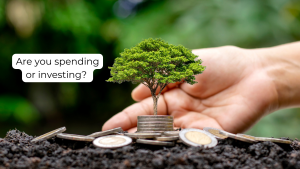This is an excerpt from our weekly newsletter. To get other timely tips and inspiration, make sure you’re on the list: www.thejilljames.com/newsletter
Let’s talk about your relationship with money.
Half of you just cringed. Somebody definitely screamed. I predict six of you will click off this post.
I’ve yet to meet a founder that hasn’t confronted a limiting belief around money in their journey of entrepreneurial growth.
Do I have enough of it?
Should I spend it or hold it?
Am I good with it?
Do I deserve it?
Most of us grew up with a scarcity mindset. Money doesn’t grow on trees. Save for a rainy day. A bird in the hand is worth two in the bush. (That one’s weird, but it means be content with what you have rather than take a risk and lose it all.) Neither a borrower nor a lender be.
Think about it for a second: how many scary messages did you get about money? How many positive ones?
It makes sense that most of us grew up in a mindset of scarcity, given US income distribution. Facts:
- The top 1% of US households has at least $5 million in assets.
- The top 1% of income earners make at least $466,719 per year.
- That’s 1.6 million households.
Which means 126.4 million other households did NOT grow up in the 1%. In fact, well over half of US households live on $75,000 or significantly less — in fact, 12 million households live on less than $15,000 per year. Which means many entrepreneurs have experienced insecurity of basic needs: food, housing, clothing. Maybe we grew up in a household where they just never seemed to be enough, whether it was core needs, time, attention, or love. And all of that imprints on how we relate to money.
I could get into how money works, things like investment, growth, value, compound interest, and appreciation.
But before we even get to that, we’ve got to drop our cultural and experiential money baggage. To get your mind right with money, I encourage you to explore two mindsets: growth and abundance.
A growth mindset means you believe your abilities can be increased, problems can be solved. Your basic qualities can be cultivated through your efforts, strategies, and help from others. (That’s the definition from Dr. Carol Dweck in her book, Mindset.)
An abundance mindset means you believe the world or the universe has enough resources and time for you to achieve all of your goals. Practicing gratitude is essential to cultivating abundance. (This was popularized by Steven Covey in the timeless The Seven Habits of Highly Effective People.)
I’m reminded of an anecdote shared by one of my readers about her experience in switching banks. She decided to physically go to the branch, collect a cashier’s check, and ferry it over to the new bank on her bike. With tens of thousands of dollars of irreplaceable money in her bike bag, she enjoyed a ride and a nice lunch.
At the time, I said that felt terrifying. She said it empowered her feelings of abundance.
How would that make you feel?
Many of you will see your first half results over the next few weeks and panic. You may start taking any deals you can find, discounting, and hustling.
Before you take action, I encourage you to pause for a moment and think about what you’re feeling and how it relates to your money goals.
If your goal is to earn more, I encourage you to raise your consciousness of your money mindset. Consider why and where you’re spending, which decisions you might be avoiding, or even note a few things you’re grateful for. Then revisit what you want to do so you aren’t repeating the old patterns that got you here.
If you’d like to do some more structured planning along with this money mindset work, grab a 20-minute Strategy Session with me.



